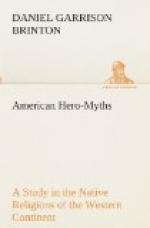I may here repeat what I have elsewhere written on this figurative expression in the Maya languages: “The literal or physical sense of the word heart is not that which is here intended. In these dialects this word has a richer metaphorical meaning than in our tongue. It stands for all the psychical powers, the memory, will and reasoning faculties, the life, the spirit, the soul. It would be more correct to render these names the ‘Spirit’ or ‘Soul’ of the lake, etc., than the ‘Heart.’ They indicate a dimly understood sense of the unity of spirit or energy in all the various manifestations of organic and inorganic existence.” The Names of the Gods in the Kiche Myths, Central America, by Daniel G. Brinton, in Proceedings of the American Philosophical Society, vol. xix, 1881, p. 623.]
The immediate neighbors of the Tzendals were the Mixes and Zoques, the former resident in the central mountains of the Isthmus of Tehuantepec, the latter rather in the lowlands and toward the eastern coast. The Mixes nowadays number but a few villages, whose inhabitants are reported as drunken and worthless, but the time was when they were a powerful and warlike nation. They are in nowise akin to the Maya stock, although they are so classed in Mr. H.H. Bancroft’s excellent work.[1] They have, however, a distinct relationship with the Zoques, about thirty per cent of the words in the two languages being similar.[2] The Zoques, whose mythology we unfortunately know little or nothing about, adjoined the Tzendals, and were in constant intercourse with them.
[Footnote 1: “Mijes, Maya nation,” The Native Races of the Pacific States, Vol. v, p. 712.]
[Footnote 2: Apuntes sobre la Lengua Mije, por C.H. Berendt, M.D., MS., in my hands. The comparison is made of 158 words in the two languages, of which 44 have marked affinity, besides the numerals, eight out of ten of which are the same. Many of the remaining words are related to the Zapotec, and there are very few and faint resemblances to Maya dialects. One of them may possibly be in this name, Votan (uotan), heart, however. In Mixe the word for heart is hot. I note this merely to complete my observations on the Votan myth.]
We have but faint traces of the early mythology of these tribes; but they preserved some legends which show that they also partook of the belief, so general among their neighbors, of a beneficent culture-god.
This myth relates that their first father, who was also their Supreme God, came forth from a cave in a lofty mountain in their country, to govern and direct them. He covered the soil with forests, located the springs and streams, peopled them with fish and the woods with game and birds, and taught the tribe how to catch them. They did not believe that he had died, but that after a certain length of time, he, with his servants and captives, all laden with bright gleaming gold, retired into the cave and closed its mouth, not to remain there, but to reappear at some other part of the world and confer similar favors on other nations.




